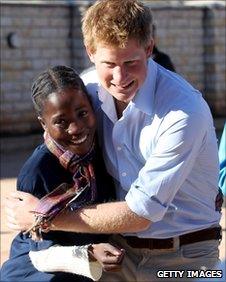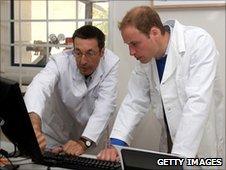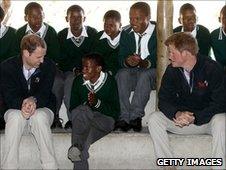William and Harry show passion and commitment in Africa
- Published

Prince Harry's charity, Sentebale, supports children with HIV-Aids
"My heart belongs in Africa," said Harry, at the end of the five-day visit by him and his elder brother William to the continent.
Watching and listening to the two of them talk about what Africa means to them, there is no doubt that their commitment to it is a very real one.
As William put it: "I adore Africa because it is so different.
"I like getting away from the cities... I like being anonymous... I like the wildness of it all."
Harry nodded and indicated that felt he exactly the same.
And, certainly, part of the attraction is indeed that Africa represents a refuge for both of them: a continent to which they can come to get away from the spotlight of their positions as young British princes.
But they have both shown over the past few days that they want to come to Africa as very much more than super-celebrities seeking an away-from-it-all bolthole.
Educating children
Both princes have causes that are close to their hearts.
In William's case, it is nature conservation programmes operated by the Tusk Trust, the charity of which he is patron.
In Botswana, he and Harry went to the Mokolodi Nature Reserve, near the capital Gaborone, and then to the Okavango Delta in the north of the country.
It may have been images of them with a python draped across their shoulders which caught the media's attention, but what mattered to William was the opportunity to see what the Tusk Trust is doing to educate Botswanan children about the importance of conservation.

William was shown the latest research being done to protect Africa's wildlife
He was also interested in a pioneering programme operated by the Botswana Predator Conservation Trust to preserve species like cheetah, leopard and lion by using science to better understand their behaviour and communication systems.
And then in Lesotho - one of the most impoverished countries in Africa - Harry was able to show William what his charity, Sentebale, has achieved in the desperate effort to combat the country's HIV-Aids epidemic.
They went high up into Lesotho's mountains to visit a school for herd boys, the children - some as young as five - who are sent up into the hills on their own to look after the livestock.
The herd boys have very little education, no awareness of the risks of HIV and Aids, and can be very vulnerable to abuse and exploitation by their masters and other adults.
Standing in a freezing hut lit by paraffin lamps, William and Harry met a group of boys, some of whom regularly walk up to 10 miles to reach their makeshift classroom.
The brothers were given a warm welcome - Harry especially, since Sentebale supports the school.
It was, as William said later, one of the most moving moments of the visit, and he paid tribute to the work of his younger brother in creating the charity.
Diana's memory
Translated from Sesotho, the language of Lesotho, Sentebale means "forget me not".

The princes both say Africa has a special place in their hearts
Harry set up the charity with Lesotho's Prince Seeiso in memory of his mother, Diana, Princess of Wales.
Sentebale is now playing a critical role in Lesotho's battle against HIV-Aids.
Last year, the charity spent nearly a million pounds supporting some of the orphanages which look after the estimated 160,000 children who've lost one or both parents to the disease and paying the running costs of seven schools for children with special needs.
Reflecting on his days in Africa, Harry said: "I have always hoped that I would make my mother and father proud. I like to think she would be proud now."
Certainly, the sight of William and Harry bringing their informal style to Africa will have stirred memories of Diana, Princess of Wales.
And the sense of purpose and commitment which they've both demonstrated to their respective causes means that this will be a continent to which they will return again and again.
- Published17 June 2010
- Published16 June 2010
- Published15 June 2010